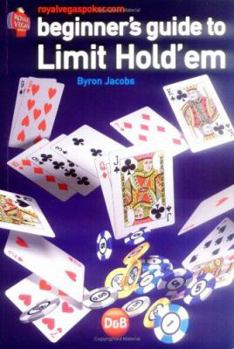Beginner's Guide to Limit Hold'em
Select Format
Select Condition 
Book Overview
This book will provide you with sufficient knowledge to commence your poker career or hobby as a winning player at samll stakes games.
Format:Paperback
Language:English
ISBN:1904468217
ISBN13:9781904468219
Release Date:December 2005
Publisher:D&B Publishing
Length:272 Pages
Weight:0.95 lbs.
Dimensions:0.7" x 6.1" x 9.0"
Customer Reviews
2 ratings
A Remarkably Lucid Explanation of Limit Holdem
Published by Thriftbooks.com User , 14 years ago
Herman Jackson's review, with which I wholeheartedly agree, says it all, or almost all. In my opinion, Byron Jacobs is a fantastic teacher. Like Bob Ciaffone, he is a master chess player, and he shares with the latter the ability to organize and prioritize, presenting an incisive analysis, that is highly relevant to strategy, in a readily accessible manner. Also, like Ciaffone, he provides numerous examples with their analysis. His "Beginner's Guide to Limit Holdem," though much more elementary than his masterful "How Good is Your Limit Holdem?", is worth reading and rereading. The four first chapters of this Guide are decidedly for the rank beginner, though the examples are very interesting to review, and the section on Understanding Hand Strength, in Chapter 3, coupled with a key point on the Texture of the Board (p.56), are worth reading well beyond the elementary level. Starting on Chapter 5, Jacobs covers all the basic concepts that relate to LH strategy. Chapter 5 focuses on Outs and Tainted Outs, and Chapter 6 provides a clear presentation of Pot Odds and Implied Odds. Chapters 7 and 8 give the clearest explanation of LH Pre-Flop principles and Strategy I've ever read, including a masterful conceptual discussion of Starting Hands. On Chapter 9, Jacobs explains his approach to Post-Flop play, stressing his view that Flop and Turn are so closely related that, strategically, they should be considered as one of the 3 sections of the game (the other 2 being Pre-Flop and River). This chapter covers, among other things, Betting, Raising, and the Free Card. Chapter 10 on Post-Flop Strategy is rich in concepts and examples. This is vintage Jacobs, with multiple examples and analyses reminiscent of his more famous "How Good is Your Limit Holdem?" In this chapter, he covers, among many other things, the Importance of Position, Drawing, Semi-Bluffing, Slowplaying, River Play, etc. Chapter 11, Final Thoughts, is a brief discussion of general considerations and advice for aspiring poker players. It includes a discussion on Tilt which contains a most useful reminder: "If you are a good player and you play better than your opponents, they will appear to be much luckier than you." I have found myself rereading many sections of this book, in particular, chapters 7-10. In my humble opinion, it is the best beginners' book ever written on LH. It is also a great introduction to Jacobs' own conceptualization of the game, and will help you tune in to his other, more advanced works on LH.
Beginner's Guide -- and Much More
Published by Thriftbooks.com User , 17 years ago
I'd like to think I left the "beginner" stage some time ago, consequently I haven't paid much attention to this book since I purchased it several months ago. However in researching the topic of dominated hands I remembered that Jacob's book had a good discussion of the topic - indeed it was reading this section in a bookstore that convinced me to buy the book though I had no intention of immediate use. Thus it was that I retrieved it from the shelf and sat down to read that section. One thing led to another and now, several hours later, I find that this book has some of the clearest explanations of important topics that I've found anywhere. If you are a new player the first half of the book introduces you to the fundamentals. If you are an experienced player you'll think you already know this stuff, and probably you do. Even then you'll find some of it, especially the chapter titled "How Hands Develop" to be worth a careful read. The second half of the book presents nothing new, nothing you can't find in Sklansky, Miller, et. al. Then why am I writing a positive review - simply because Jacobs writes so clearly and succinctly that this is a great place for a beginner to ... well, to begin. More experienced players may find themselves wondering why nobody else ever said it so well. In short readable sections Jacobs thoroughly explains concepts such as outs, hand odds, pot odds, implied odds, position, domination, aggression, playing various types of hands from various positions, etc. Many beginners clearly have trouble believing the importance of position as an excursion into poker sites on the Internet will attest. In less than two pages Jacobs' description of "The Game of 100" should convince anyone of the importance of position. If you are a beginner I'd recommend this book over just about anything else on my bookshelf (over 100 poker titles). After you've read it you'll be ready for the hardcore - and hard to read due to writing style - books by Sklansky et. al. More importantly, you'll be ready for the limit tables.





